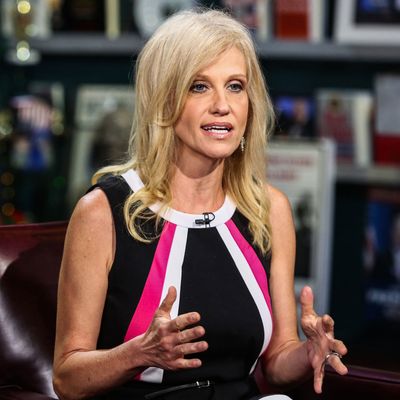
If you are a poll-obsessed novice politician who must always look like a “winner,” disappointing poll numbers represent something of an existential crisis. So such a politician will be naturally drawn to theories that explain away the bad news — and to campaign operatives willing to package them up and sell them.
This could be the key to Kellyanne Conway’s appearance as Donald Trump’s campaign manager. Her most distinctive contribution to the Trump campaign so far has been to lend her own credibility as a pollster to the dubious “shy Trump voter” theory — the idea that polls (especially live-interview polls) understate his support because certain voters don’t think it’s socially acceptable to vote for him, but intend to do so anyway. Conway first explained it in some detail in an interview with a U.K. television network, perhaps because the “shy Tory voter” phenomenon (a tendency, mainly in the 1990s, of polls to understate Conservative Party support) is a familiar part of the British political landscape.
“Donald Trump performs consistently better in online polling where a human being is not talking to another human being about what he or she may do in the elections … it’s become socially desirable, especially if you’re a college educated person in the US, to say that you’re against Donald Trump,” said Conway.
“People who are supporting Donald Trump, who have not voted Republican in the past, who have not voted in quite a while, are so tired of arguing with family and friends and colleagues about their support of Donald Trump that they just decided not to discuss it.”
Trump himself aired this theory off and on during the primaries, even alluding to the American counterpart to the “shy Tory voter” theory, the Bradley Effect (named after African-American politician Tom Bradley, who lost a California governor’s race after leading in the polls, presumably because poll respondents did not want to admit they were voting against a black man). Trouble is, the primary results did not bear it out: If anything, Trump underperformed in his poll numbers. But that didn’t keep his campaign from reviving the theory when it became convenient — i.e., when Trump began trailing Hillary Clinton in the polls, particularly after the conventions.
As noted above, Conway has added a key twist to the theory: the argument that “online polling” captures the true state of affairs better than live-interview or automatic-call polling, because it does not involve confessing support for Trump to another human being, or even a recording of one. Again, the problem is that there is no significant pro-Trump “lean” in online polls as compared to other methodologies. There is, however, one online poll that Conway is probably alluding to: a Los Angeles Times/USC tracking poll that has been consistently showing Trump doing about six points better than the polling averages since the conventions. There is an alternative explanation for this particular survey’s pro-Trump lean, however, as pointed out by Nate Cohn: For purposes of weighting the results to reflect an accurate sample, the poll lets respondents self-report who they voted for in 2012. Given the tendency of people to inaccurately report support for the winner of past elections, that may have produced a sample with a excess of actual 2012 Romney voters, and thus a pro-Republican “lean.”
In any event, Conway’s assertion that a particular kind of voter is being discovered or missed by a particular kind of poll doesn’t hold much water. But what’s really strange is Conway’s mysterious hints to U.K. TV that Team Trump has a mysterious technique for reaching and mobilizing these mysterious “undercover voters.”
Conway insisted: “We give people a comfortable way to express that maybe they don’t want to vote this year and why that is.” She described her method as “proprietary”. She said that as a result, she could reach these undercover voters “in many different ways”. She said: “We go to them where they live, literally.”
This could be a reference to something deep and revolutionary. But more likely it is Pollster Word Salad. The Trump campaign is famously underinvesting in field efforts, which are generally how campaigns “go to where [voters] live, literally.” The Washington Post’s Philip Bump suggests maybe Conway is talking about social-media initiatives. But as he observes, social media is not a particularly good way to get marginal voters to show up at the polls.
The more you stare at Conway’s remarks, and note their consistency with one of the bedrock rationalizations of the Trump campaign from start to finish, the more the “undercover Trump voter” rap sounds like a bedtime story for the candidate and his core supporters, who believe strongly that looking like a winner is a key to becoming and remaining one.
In truth, embracing “hidden majority” theories are a danger sign for any campaign, relying as they do on unverifiable notions hard to separate from mere wish fulfillment. It was true of Ted Cruz’s laughable claim that “54 million evangelicals” who didn’t vote in 2012 were massing to lift him to the White House. And it may be true of Conway’s invisible Trump legions today.






























